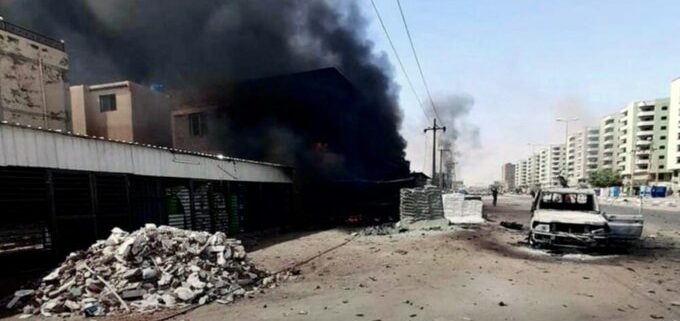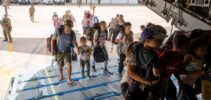The official army stated that it was willing to respect a new seven-day truce negotiated by mediators in South Sudan, but the Rapid Support Forces (FAR), a rival paramilitary group, did not respond to the announcement.
ADVERTISING
Residents of Khartoum reported intense explosions and gunfire during the early hours of the morning on the streets of the country's capital.
Fighting began on April 15 between the army commanded by General Abdel Fatah al Burhan, the country's de facto leader, and the paramilitary forces of his former ally and now rival, Mohamed Hamdan Daglo.
At least 550 people died and 4.926 were injured, according to the Health Ministry's most recent report, which likely includes conservative figures.
ADVERTISING
The conflict “caught the UN by surprise”, said United Nations Secretary-General Antonio Guterres on Wednesday. He highlighted that the international organization is confident in the success of negotiations for a transition towards a civilian government.
“We can say that we failed to stop it,” acknowledged Guterres. “A country like Sudan, which has already suffered so much (…) cannot allow a struggle for power between two people,” he added.
“Settlements burned or destroyed”
When the fighting broke out, the two generals were supposed to participate in a meeting with international mediators to talk about the integration of the FAR into the official army, a crucial condition for the democratic transition.
ADVERTISING
Khartoum, however, woke up to a scene of street fighting on April 15.
“With every minute of war, more people die or take to the streets, society disintegrates and the state weakens and decays a little more,” said Khalid Omar Youssef, a civilian minister in the government ousted in a 2021 coup led by the generals.
UN Humanitarian Affairs Secretary Martin Griffiths made a whirlwind visit to Sudan on Wednesday to negotiate safe entry for aid and aid workers, after six World Food Program (WFP) aid trucks were looted when headed to the Darfur region.
ADVERTISING
This region of western Sudan still suffers the consequences of a war that began in 2003, when the then dictator Omar al Bashir sent the Janjaweed militias, made up of Arab tribes, to attack rebellious ethnic minorities.
The NGO Norwegian Refugee Council said violence in West Darfur's capital, El Geneina, left at least 191 people dead.
“Dozens of settlements were burned or destroyed and thousands of people were displaced,” the NGO said.
ADVERTISING
Both Griffiths and the UN special envoy for Sudan, Volker Perthes, spoke with Burhan and Daglo by phone about the need to send aid to the population, the former tweeted.
The UN High Commissioner for Human Rights, Volker Turk, described the situation as “heartbreaking” and “catastrophic”.
Furthermore, he accused the army of bombing the vicinity of a hospital and the FAR of using civilian buildings as bases.
“African solutions”
Mediation efforts are increasingly intense, but the army announced on Wednesday that it prioritizes initiatives from the East African regional bloc because it wants “African solutions to the continent’s problems.”
It also said it was examining a US-Saudi initiative to stop the fighting.
The Arab League will meet on an emergency basis on Sunday to address the situation in the country, a diplomatic source told AFP.
Nearly 450.000 civilians have fled their homes since the start of the conflict, the International Organization for Migration (IOM) said, including 115.000 who have fled to other countries.
Since the fall of Bashir in a coup in 2019, during a popular uprising, international mediators have tried to bring civilians and military personnel to the negotiating table.
Analysts, however, consider that the process gave excessive prominence to Burhan and Daglo, who in October 2021 allied themselves in a coup that caused the collapse of the transition to a civilian government.
* The text of this article was partially generated by artificial intelligence tools, state-of-the-art language models that assist in the preparation, review, translation and summarization of texts. Text entries were created by the Curto News and responses from AI tools were used to improve the final content.
It is important to highlight that AI tools are just tools, and the final responsibility for the published content lies with the Curto News. By using these tools responsibly and ethically, our objective is to expand communication possibilities and democratize access to quality information. 🤖




